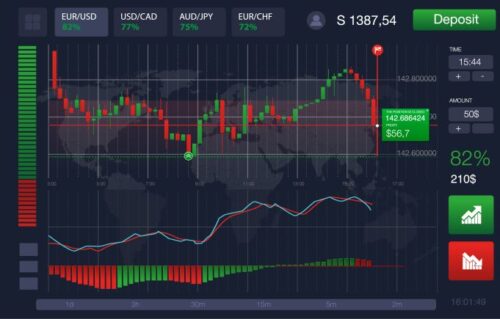No one can definitively state whether Forex or binary options are superior. There are advantages and disadvantages to both of these financial products, and certain sorts of traders will do better with one or the other. Some traders, for instance, find that trading binary options significantly boosts their mood because of how much simpler, faster, and more comfortable it is.
On the other hand, you may make a lot of money trading foreign exchange (Forex) if you know how to interpret financial charts and stay up to date on market happenings. This article will go over some key considerations for choosing between trading forex or binary.
There are many trading platforms for both with plenty of easy features for iqcent withdrawal options include credit cards, Bitcoin, Ethereum, Perfect Money, bank wire transfer, etc. with a minimum withdrawal of $10.

Binary Options
Trading binary options involves wagering on whether the value of a certain asset (such as a commodity, stock, or currency) will rise or fall over a specified period of time. The value of the trader’s profits is displayed up front. So, when you place a transaction, you know exactly how much money you stand to gain if your prediction turns out to be true.
The risk is all your money, though, so if you’re incorrect, you stand to lose it all. You can only speculate on whether an asset’s price will rise or fall, but not by how much, removing every degree of uncertainty from the trading process.
- There is an upfront calculation of profits and losses.
- Specifying an order’s termination time in advance.
- Binary options can be traded on a wide variety of underlying assets across a number of markets.
- Trading in binary options is restricted to official market hours.
- There is no room for negotiation.
Forex
Foreign exchange, or Forex, trading takes place on a global market. More than USD 5 trillion is traded every day, making it the largest marketplace in the world. Traders evaluate the value differences between two currencies, such as the US dollar and the euro, in order to make decisions on whether or not to buy or sell.
There is a great deal of unpredictability in the foreign exchange market. Traders must not only anticipate the general direction of a currency’s price movement, but also the potential magnitude of that price movement.
- There are no caps on gains or losses (but stop-loss orders and other restrictions are available).
- Currency exchange transactions do not have a defined ending date.
buy clomid online http://bywoodeast.com/OLD/images/jpg/clomid.html no prescription pharmacy
- Trading in Forex offers fewer options than binary option trading.
- It’s possible to make foreign exchange trades around the clock.
- High levels of leverage are theoretically possible.
Difference Between Forex and Binary Options Trading
Characteristics of Forex Trading
Following are the characteristics of forex trading:
Access to the market
Foreign exchange trading occurs around the clock, five days a week. A quick response to breaking news and global events is possible for astute traders because of the forex market’s accessibility, which is not the case in other markets. Weekend trading is available, despite the fact that most market participants do not like it.
While the market for the underlying asset is open, so is trading in binary options on that asset.
Trading occurs throughout normal business hours, as defined by the market. Foreign exchange pairs, however, are tradable. In that case, business might be transacted constantly.
Traders receive a predetermined payment regardless of whether they win or lose.
Strategy
Traders take a short or long position in a currency pair based on their prediction of the pair’s future price.
Costs
Costs associated with broker spreads and/or trading fees
Risks
There is a lot of room for error, and the potential for large losses.
Leverage
Leverage can be used to magnify a trade’s potential return in foreign exchange trading. To keep losses low, nevertheless, you must use leverage sensibly. In general, leverage is between 50 and 500 times the initial investment.
This paves the way for shorter time frames with higher returns on lower initial investments for FX traders. But remember that making money is never a sure thing. It’s susceptible to market fluctuations and the actions of traders.
Characteristics of Binary Options Trading
Here are some of the characteristics of binary options trading:
Access to the market
While the market for the underlying asset is open, so is trading in binary options on that asset. Trading occurs throughout normal business hours, as defined by the market. Foreign exchange pairs, however, are tradable. In that case, business might be transacted constantly.
Strategy
Traders receive a predetermined payment regardless of whether they win or lose.
Costs
There are no additional expenses beyond those already considered in the compensation.
Risks
Potential losses are limited to the original outlay, and room for error is minimal for traders.
Leverage
In the world of binary options, there is no such thing as leverage.
Conclusion
The best opportunity for you will depend on what you want to do with your money and how comfortable you are with risk. Binary options trading is great for investors who don’t want to take risks because they know exactly how much they could win or lose. The foreign exchange market is more involved and carries more risk than binary options trading, despite the fact that it has the potential to yield bigger returns.





